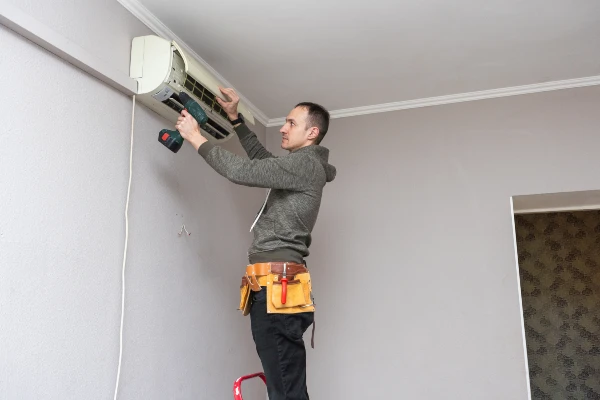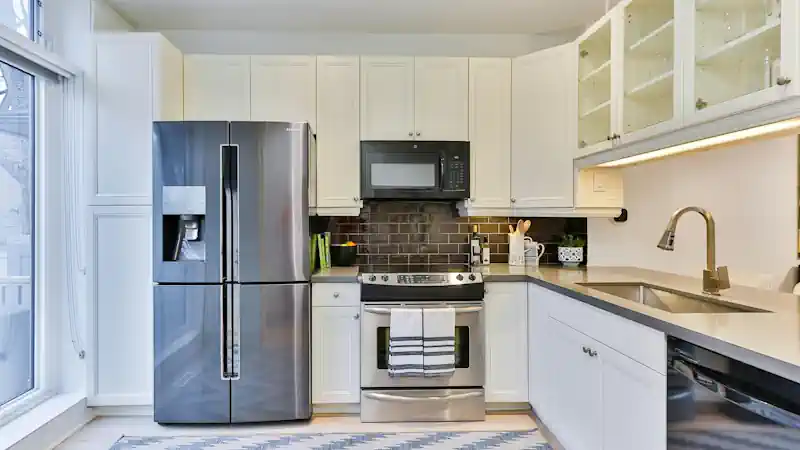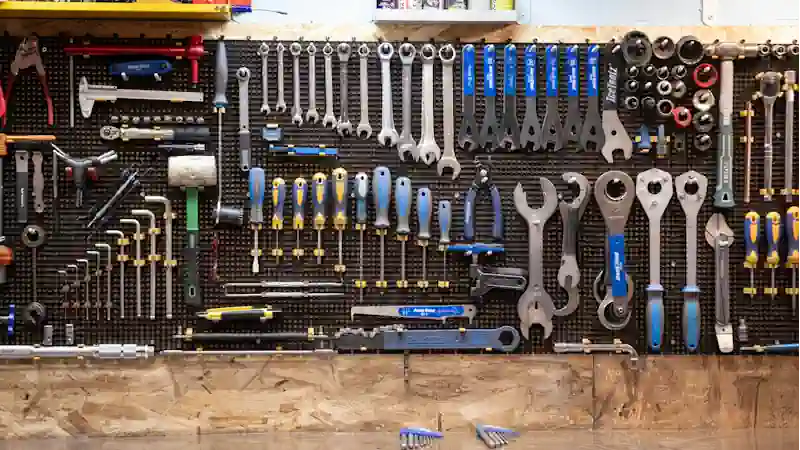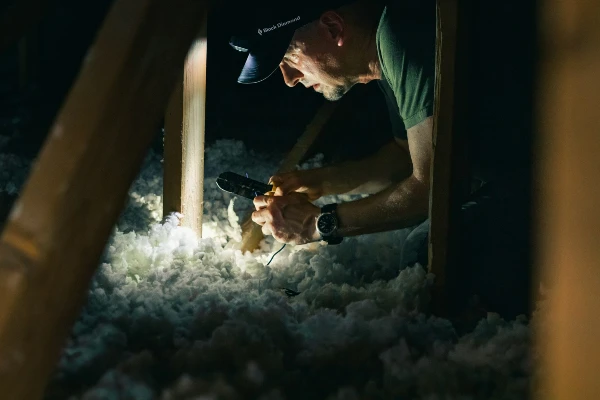Disclosure: This post may contain affiliate links, meaning we get a commission if you decide to make a purchase through our links, at no cost to you. Please read our disclosure for more info.
Air conditioning problems are a reality homeowners face, especially when the weather heats up. AC units are crucial for keeping your home cool, but like any appliance, they can face issues that disrupt their performance. Knowing what to look for can save you from costly repairs and provide peace of mind. This guide covers common AC problems that homeowners deal with and offers practical solutions for each.
In This Post:
- 1. Indoor Water Leaks
- 2. Outdoor Water Leaks
- 3. AC Refrigerant Leak
- 4. Dirty AC Filter
- 5. Damaged Compressor
- 6. Frozen Evaporator Coil
- 7. Capacitor Failure
- 8. Thermostat Malfunctioning
- 9. AC Making Strange Noises
- 10. Circuit Breaker Keeps Tripping
- 11. AC Smelling Bad
- 12. Leaking Ducts
- 13. Failure of Electric Control
- 14. AC Fan Failure
- 15. Weak Airflow
- Conclusion
1. Indoor Water Leaks
One of the most noticeable problems is when water starts leaking from your air conditioner inside the house. This could be due to a blocked condensate drain or a failing pump.
What Causes It?
- A clogged condensate drain line can block the water’s exit route, leading it to spill inside.
- A malfunctioning condensate pump can fail to push the water outside.
How to Fix It?
- You can unclog the drain with a wet/dry vacuum or pour a bit of vinegar down the line to kill algae or fungi.
- If the pump is the issue, either clean or replace it. Always refer to the unit’s manual for guidance on locating and addressing the drain line.
2. Outdoor Water Leaks
You may see a puddle forming under your outdoor AC unit, which is often a sign that something’s wrong with the condensate pan or seal.
Why It Happens:
- The condensate pan could be cracked, or the seal could be faulty, allowing water to leak out.
- Improper installation of the outdoor unit might also contribute to leaks.
Solution:
- Start by turning off the power to your AC unit and checking for any visible cracks or issues.
- If a problem is detected, the issue might require replacing the drain pan or resealing the unit. In such cases, consulting experienced AC repair professionals can help ensure the problem is addressed correctly and prevent further complications.
3. AC Refrigerant Leak
Refrigerant is essential for cooling the air, and if your system has a leak, it won’t cool your home effectively.
What Causes It?
- Over time, the refrigerant lines may degrade, or the connections may loosen, causing leaks.
- Excessive vibration or physical damage to the unit can also result in refrigerant loss.
How to Address It:
- For minor leaks, a technician will refill the refrigerant and seal the leak. However, in severe cases, parts of the refrigerant lines might need to be replaced.
- Important: Refrigerant is a hazardous substance, so it’s always recommended to hire a professional to handle this repair.
4. Dirty AC Filter
A dirty filter is one of the easiest problems to fix, but it can cause big issues if neglected. It restricts airflow, making your system work harder and reducing efficiency.
Why Does This Happen?
- Filters trap dust, dirt, and debris from the air, but over time, they get clogged, leading to reduced airflow.
How to Solve It?
- Simple Fix: Replace disposable filters every 1-3 months. If your filter is reusable, wash it and let it dry thoroughly.
- During high-use seasons, cleaning every two weeks is recommended to ensure smooth airflow and avoid strain on your system.
5. Damaged Compressor
The compressor is the heart of your air conditioner. Without it, your unit won’t cool the air effectively, and you’ll notice your AC’s performance drop.
What Causes It?
- Insufficient refrigerant, poor lubrication, or dirt buildup on the coils can lead to compressor failure.
- Over time, constant pressure and temperature fluctuations can cause internal damage to the compressor.
How to Fix It:
- Replace the compressor: If the compressor is malfunctioning or damaged beyond repair, the best solution is to replace it. A technician can help determine whether a repair or replacement is the most cost-effective option.
6. Frozen Evaporator Coil
If your AC is running but not cooling the air properly, it might be due to a frozen evaporator coil. This is one of the most common problems that leads to poor cooling.
Why It Happens:
- Clogged filters or reduced airflow can prevent warm air from reaching the evaporator coil, causing it to freeze.
- Low refrigerant levels can also cause the coils to freeze.
Solution:
- Thaw the coil: Turn off the system and allow it to thaw. It may take a few hours for the ice to melt completely.
- After thawing, inspect the filter and replace it if necessary. If the problem recurs, you may need a technician to check for refrigerant leaks.
7. Capacitor Failure
If your AC turns on and off abruptly, or you hear a clicking noise, the issue might be with the capacitor. It’s responsible for powering up the motor when the AC starts running.
What Causes It?
- Frequent power surges or prolonged exposure to high temperatures can cause the capacitor to overheat and fail.
- Capacitors may also wear out over time.
How to Fix It:
- Contact a technician: Replacing a faulty capacitor requires professional expertise, as it involves handling electrical components.
8. Thermostat Malfunctioning
If your AC seems to run constantly, or the temperature in your home fluctuates, your thermostat might be malfunctioning.
What Causes It?
- Dust or corrosion can build up inside the thermostat, causing it to give incorrect readings.
- Dead batteries or loose wiring can also affect its accuracy.
Solution:
- Check the batteries: Replace them if needed, and clean the thermostat with a soft brush.
- If you continue to experience problems, recalibrate the thermostat or upgrade to a smart thermostat for better control.
9. AC Making Strange Noises
Unusual sounds from your AC unit are a clear indicator of trouble. These noises might include grinding, buzzing, or clicking, and each type has a different cause.
Why It Happens:
- Grinding noises: Could indicate a motor issue or worn-out bearings.
- Clicking sounds: Usually caused by a problem with the fan or capacitor.
- Buzzing noises: Could be an electrical issue or a loose part.
Solution:
- Inspect for loose parts: Tighten any loose screws and check for obstructions around the fan or motor.
- If the problem persists, contact a technician to diagnose the source of the noise and fix it.
10. Circuit Breaker Keeps Tripping
If the circuit breaker keeps tripping when you turn on your AC, it could be due to an electrical problem, such as a power surge or faulty component.
What Causes It?
- Overloading of the circuit, power surges, or internal electrical failures can trip the breaker.
- Issues like a failing capacitor or a dirty filter can also cause an overload.
How to Fix It:
- Don’t reset the breaker repeatedly. This could be a fire hazard.
- Call a professional to inspect the electrical components of your AC and diagnose the issue safely.
11. AC Smelling Bad
Bad odors coming from your AC can indicate several issues, including mold growth, electrical problems, or even dead animals inside the system.
Why It Happens:
- Musty smells are usually due to mold or mildew inside the unit.
- A burning smell indicates electrical problems, while a rotten egg smell may signal dead pests.
Solution:
- Clean the system thoroughly to remove any mold or mildew buildup.
- For burning smells or gas leaks, turn off the AC immediately and call a professional for repairs.
12. Leaking Ducts
Leaking ducts are a common problem, especially in older homes. Leaks in your ductwork can lead to poor cooling performance and higher energy costs.
Why It Happens:
- Ducts can become damaged over time due to wear and tear, causing air to escape before reaching the rooms.
- Leaks may also result from poor installation or lack of maintenance.
How to Fix It:
- Inspect the ducts for visible holes or tears. You can seal small leaks with duct tape, but it’s best to use mastic sealant for long-term repairs.
- For extensive damage, contact a professional to repair or replace the ducts.
13. Failure of Electric Control
Electric control failure can cause your AC to turn on and off frequently, leading to strain on components like the compressor and fan.
What Causes It?
- Frequent cycling and power surges can stress the electrical controls in your system.
Solution:
- Contact a professional to inspect the electrical system and replace any damaged components.
14. AC Fan Failure
The fan is essential for cooling, and if it stops working, your AC will struggle to release heat properly.
Why It Happens:
- Motor or wiring issues can prevent the fan from functioning, or debris may obstruct it.
Solution:
- Turn off the AC and inspect the fan. If you notice loose wiring or damaged components, contact a professional to replace them.
15. Weak Airflow
Weak airflow is often a sign of dirty filters, faulty blower motors, or blocked ducts. This can significantly reduce your AC’s efficiency.
What Causes It?
- Clogged filters or blocked vents can restrict airflow.
- Leaking ducts or a malfunctioning blower motor can also cause weak airflow.
How to Fix It:
- Clean or replace your filters and ensure vents aren’t obstructed.
- If airflow doesn’t improve, have a technician check the blower motor and ducts.
Conclusion
Your air conditioner is a vital part of keeping your home comfortable. Understanding the common problems it may face and knowing how to address them can save you both time and money. Regular maintenance is key to preventing these issues, but if you ever encounter a problem that’s beyond your expertise, don’t hesitate to call a professional. By staying proactive, you can keep your AC running efficiently throughout the year.




